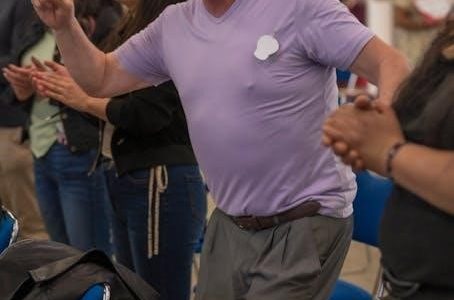Leadership workshop activities are designed to enhance skills through interactive exercises, fostering collaboration and decision-making. These practical tools help participants develop confidence and effectiveness in real-world scenarios.
Overview of Leadership Development
Leadership development is a dynamic and continuous process aimed at fostering essential skills for effective guidance and inspiration. It focuses on cultivating qualities like empathy, communication, and decision-making through structured activities and real-world applications. Workshops often include exercises designed to identify strengths and address weaknesses, helping participants grow both personally and professionally. These programs emphasize the importance of adaptability, resilience, and ethical decision-making in diverse contexts.
By integrating interactive tools and collaborative challenges, leadership development equips individuals to navigate complex organizational environments. It encourages a growth mindset, empowering leaders to embrace challenges and drive positive change. The ultimate goal is to create confident, principled leaders who can inspire and motivate others to achieve shared objectives.
Importance of Interactive Workshops
Interactive workshops are crucial for fostering engagement and practical learning in leadership development. They provide a hands-on environment where participants can apply theoretical concepts to real-world scenarios. By encouraging collaboration and active participation, workshops help individuals build confidence and refine their leadership skills. These dynamic sessions often include team-building exercises, decision-making challenges, and communication activities, which enhance problem-solving abilities and interpersonal connections. Workshops also offer a platform for receiving immediate feedback, allowing participants to identify areas for improvement and track their progress. This experiential approach ensures that leaders are better equipped to handle diverse challenges and lead effectively in their organizations.
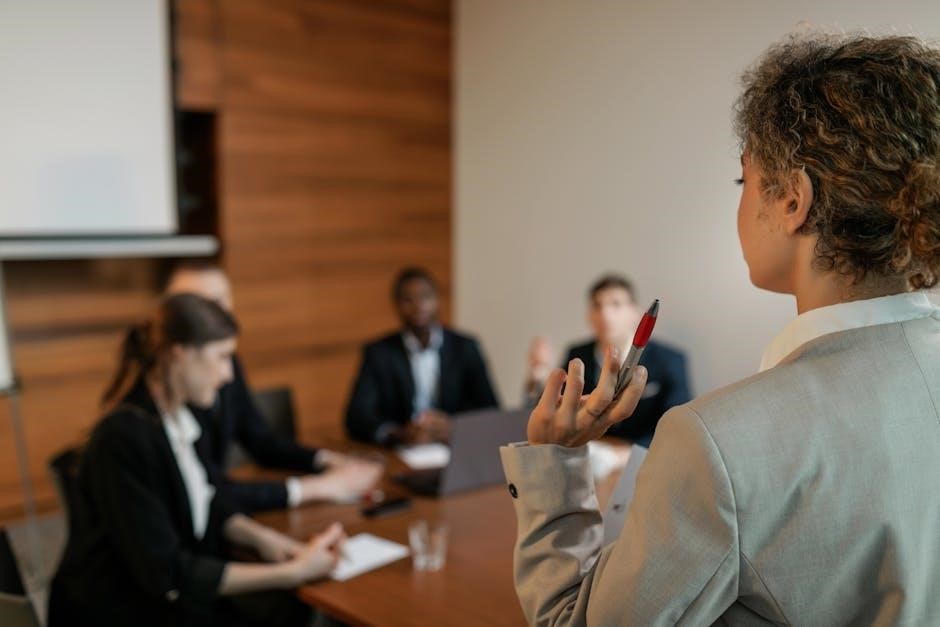
Types of Leadership Workshop Activities
Leadership workshops feature diverse activities like icebreakers, communication exercises, and problem-solving challenges, designed to enhance collaboration, decision-making, and strategic thinking among participants.
Icebreakers and Team-Building Exercises
Icebreakers and team-building exercises are essential components of leadership workshops, designed to foster collaboration and trust among participants. These activities, such as brainstorming sessions or interactive games, encourage individuals to connect on a personal level while developing leadership skills. For instance, group exercises like listing leadership stereotypes or participating in quick warm-up games help break down barriers and create a cohesive environment. Such exercises not only enhance communication but also promote problem-solving and adaptability. By engaging in these activities, participants build rapport and learn to work effectively as a team, laying a strong foundation for more complex leadership challenges ahead. These exercises are often tailored to diverse groups, ensuring inclusivity and active participation from all members. They play a crucial role in setting a positive tone for the workshop and fostering a culture of collaboration and mutual respect.
Communication and Collaboration Challenges
Communication and collaboration challenges are vital in leadership workshops to foster effective teamwork and interpersonal skills. Activities such as group brainstorming, role-playing, and problem-solving exercises encourage participants to express ideas and listen actively. These challenges help break down stereotypes and promote inclusivity, as seen in exercises where participants brainstorm leadership traits for different genders. Interactive games, like triangular chase games, also enhance quick decision-making and adaptability. Such exercises are designed to simulate real-world scenarios, allowing leaders to practice clear communication and conflict resolution. By engaging in these activities, participants learn to navigate diverse perspectives and build stronger relationships, ultimately improving their ability to lead collaboratively. These challenges are tailored to create a dynamic environment where leaders can grow and thrive together. They are essential for developing the skills needed to manage and inspire teams effectively.
Decision-Making and Problem-Solving Activities
Decision-making and problem-solving activities are cornerstone exercises in leadership workshops, designed to enhance critical thinking and strategic planning. These activities often involve scenario-based challenges, such as survival simulations or ethical dilemmas, where participants must collaborate to reach solutions. Interactive games and case studies encourage leaders to analyze situations, weigh options, and make informed decisions. For instance, exercises like “The People Next To You” foster quick thinking and adaptability. These activities simulate real-world complexities, helping leaders develop confidence in their decision-making abilities. By tackling diverse problems, participants refine their problem-solving skills and learn to approach challenges with creativity and resilience. Such exercises are essential for equipping leaders with the tools to navigate uncertainty and drive effective outcomes in their organizations. They are integral to building a proactive and resourceful leadership mindset.
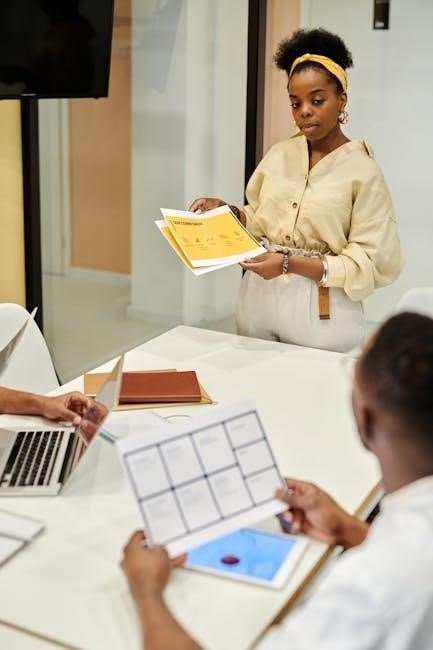
Facilitating Effective Leadership Workshops
Effective leadership workshops require creating inclusive environments, using interactive exercises, and providing feedback tools. These elements ensure active participation and measurable skill development for all attendees.
Best Practices for Workshop Facilitation
Effective workshop facilitation involves creating engaging, inclusive environments where participants feel comfortable sharing ideas. Facilitators should encourage active participation through interactive exercises and collaborative activities. Providing clear instructions and ensuring diverse perspectives are respected fosters a productive learning atmosphere. Incorporating feedback mechanisms, such as group discussions or surveys, helps identify areas for improvement. Using science-based exercises and real-world case studies enhances the practical application of leadership skills. Facilitators must also adapt activities to meet the unique needs of participants, ensuring content is relevant and impactful. By balancing structure with flexibility, workshops can achieve their goals of developing leadership capabilities and promoting personal growth.
Creating Engaging and Inclusive Environments
Creating engaging and inclusive environments in leadership workshops involves fostering participation and ensuring all voices are heard. Interactive exercises, such as brainstorming sessions and small group activities, encourage collaboration and diversity of thought. Facilitators should promote a safe space for open dialogue, where participants feel comfortable sharing their perspectives. Incorporating tools like sticky notes for brainstorming leadership stereotypes and using collaborative games can enhance engagement. Ensuring representation and addressing gender stereotypes are crucial for inclusivity. Providing opportunities for feedback and reflection helps participants grow. By integrating real-world case studies and practical exercises, workshops become dynamic spaces for learning and development, ensuring that all participants feel valued and empowered to contribute. This approach cultivates a culture of respect and collaboration, essential for effective leadership development.
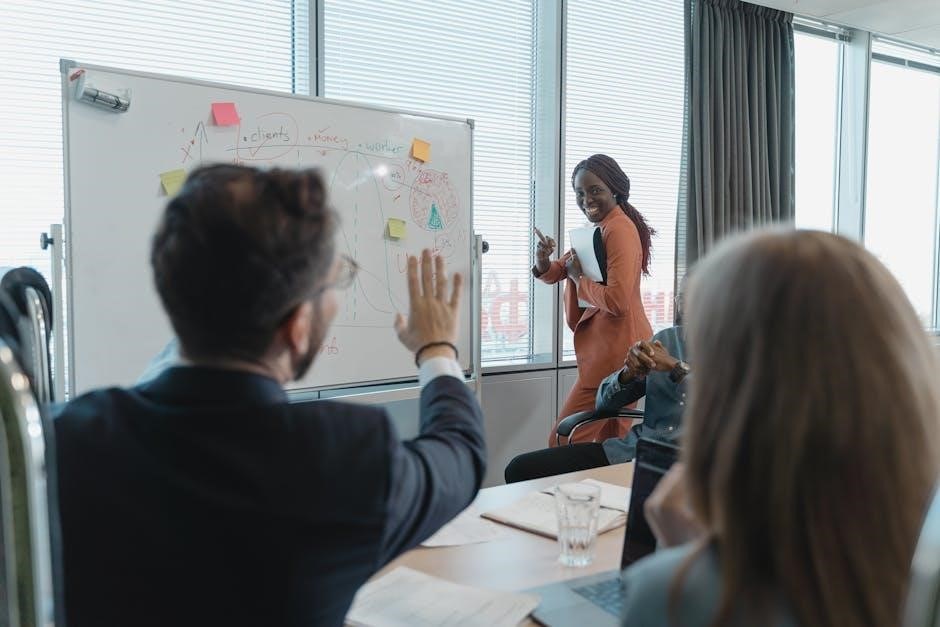
Evaluating Leadership Development Progress
Evaluating leadership development involves using assessment tools and feedback mechanisms to measure growth and identify areas for improvement, ensuring progress aligns with workshop objectives and goals.
Assessment Tools for Leadership Skills
Effective assessment tools are crucial for measuring leadership development progress. These include 360-degree feedback, personality tests, and skill-based exercises tailored to identify strengths and growth areas.
Workshops often incorporate activities like role-playing, decision-making simulations, and group challenges to evaluate problem-solving and communication skills.
Additionally, tools such as “The Leadership Challenge” by Jim Kouzes and Barry Posner provide frameworks for assessing leadership behaviors and fostering continuous improvement.
Feedback Mechanisms for Growth
Feedback mechanisms are essential for fostering leadership growth, enabling participants to reflect on their performance and identify areas for improvement.
Workshops often incorporate peer reviews, self-assessment tools, and facilitated group discussions to encourage open dialogue.
For instance, 360-degree feedback provides a comprehensive view of a leader’s strengths and weaknesses, while action planning helps set realistic goals.
These mechanisms create a safe environment for constructive criticism, fostering accountability and continuous development. Regular feedback ensures sustained progress and helps leaders refine their skills effectively.
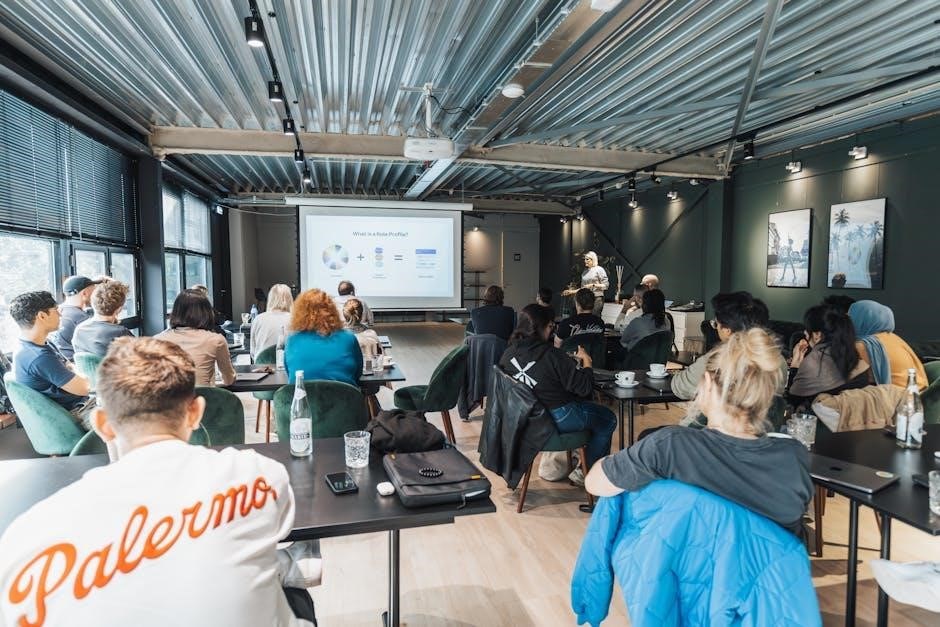
Real-World Applications of Workshop Activities
Leadership workshops provide practical tools for real-world challenges, enhancing teamwork, decision-making, and communication skills, and fostering ethical practices in diverse organizational settings.
Case Studies of Successful Leadership Programs
Case studies highlight effective leadership programs that have transformed individuals and organizations. For instance, the AMCOM leadership workshop at Redstone Arsenal engaged employees in decision-making exercises, fostering collaboration and strategic thinking. Similarly, the Atlanta Hawks workshop focused on workplace leadership, empowering students with practical skills. These programs demonstrate how structured activities, such as team-building exercises and problem-solving challenges, lead to measurable growth. Participants often report improved communication, increased confidence, and enhanced problem-solving abilities. Such case studies provide valuable insights into designing impactful leadership development initiatives, emphasizing the importance of interactive and inclusive learning environments. They serve as models for organizations seeking to cultivate strong, ethical, and sustainable leadership practices.
Integrating Workshop Learnings into Daily Leadership
Integrating workshop learnings into daily leadership involves applying acquired skills and insights to real-world challenges. Participants often use techniques such as reflection, feedback, and practical exercises to reinforce new behaviors. For example, a workshop attendee who gained confidence in public speaking now applies this skill in team meetings. Leaders are encouraged to create a culture of continuous learning, where workshop concepts like collaboration and problem-solving are embedded into daily routines. Regular feedback sessions and accountability structures help sustain these practices. By aligning workshop learnings with organizational goals, leaders can drive meaningful change and foster a more engaged, effective, and ethical work environment. This approach ensures that leadership development is not just a one-time event but a ongoing process of growth and improvement.
Cultural and Gender Considerations in Leadership
Cultural and gender considerations in leadership emphasize inclusivity, diversity, and equity. Workshops often address gender stereotypes and promote culturally sensitive practices to foster equitable leadership environments.
Addressing Gender Stereotypes in Leadership
Workshops often include exercises to identify and challenge gender stereotypes in leadership, such as brainstorming sessions where participants list traits associated with male and female leaders. These activities encourage open discussions about biases and their impact on leadership opportunities. By addressing these stereotypes, workshops promote gender equality and inclusive leadership practices. For example, small group exercises where participants write stereotypes on sticky notes help visualize common biases. Real-world applications, such as case studies of successful gender-inclusive leadership programs, further reinforce the importance of breaking down stereotypes. These activities empower individuals to recognize and overcome gender-based limitations, fostering more equitable and diverse leadership environments. The goal is to create a culture where leadership potential is not constrained by gender, but nurtured through inclusive practices.
Culturally Sensitive Leadership Practices
Culturally sensitive leadership practices are essential for fostering inclusive environments where diverse perspectives thrive. Workshops often incorporate activities that promote cross-cultural understanding, such as case studies and group discussions on global leadership scenarios. These exercises help leaders recognize and respect cultural differences, enabling them to adapt their strategies to diverse teams. For instance, activities like “Cultural Values Mapping” encourage participants to explore how different cultures influence decision-making and communication. Such practices not only enhance collaboration but also empower leaders to navigate multicultural settings effectively. By integrating these learnings, organizations can create environments where cultural diversity is celebrated and leveraged for collective success. The goal is to equip leaders with the skills to lead with empathy, respect, and awareness in increasingly globalized workplaces.
Future Trends in Leadership Development
Emerging technologies like AI and VR are revolutionizing leadership training, offering immersive learning experiences. Sustainable and ethical practices are also gaining focus, shaping the future of leadership development.
Emerging Technologies in Leadership Training
Emerging technologies like AI, VR, and online platforms are transforming leadership training. AI personalizes learning experiences, while VR creates immersive simulations for real-world scenarios. TeleSeminars and virtual workshops enable remote participation, making leadership development more accessible. These tools enhance engagement, provide data-driven insights, and cater to diverse learning styles. They also support sustainable and ethical practices by reducing the need for physical materials and promoting inclusive environments. As technology advances, it offers innovative ways to develop leaders, ensuring they are equipped with modern skills to thrive in a rapidly changing world. These advancements are reshaping traditional training methods, making leadership development more dynamic and effective.
Sustainable and Ethical Leadership Practices
Sustainable and ethical leadership practices focus on creating respectful and principled working environments. Workshops often include exercises that emphasize ethical decision-making, cultural sensitivity, and social responsibility. These activities encourage leaders to adopt values-driven approaches, ensuring their actions align with organizational and societal well-being. By integrating sustainable practices, leaders can foster long-term positive change. These workshops also address gender equality and stereotype awareness, promoting inclusive leadership. Through interactive discussions and real-world case studies, participants learn to balance productivity with ethical considerations. Such practices not only enhance individual leadership skills but also contribute to creating a more equitable and sustainable future for organizations and communities alike. These efforts ensure that leadership development is both impactful and responsible.

